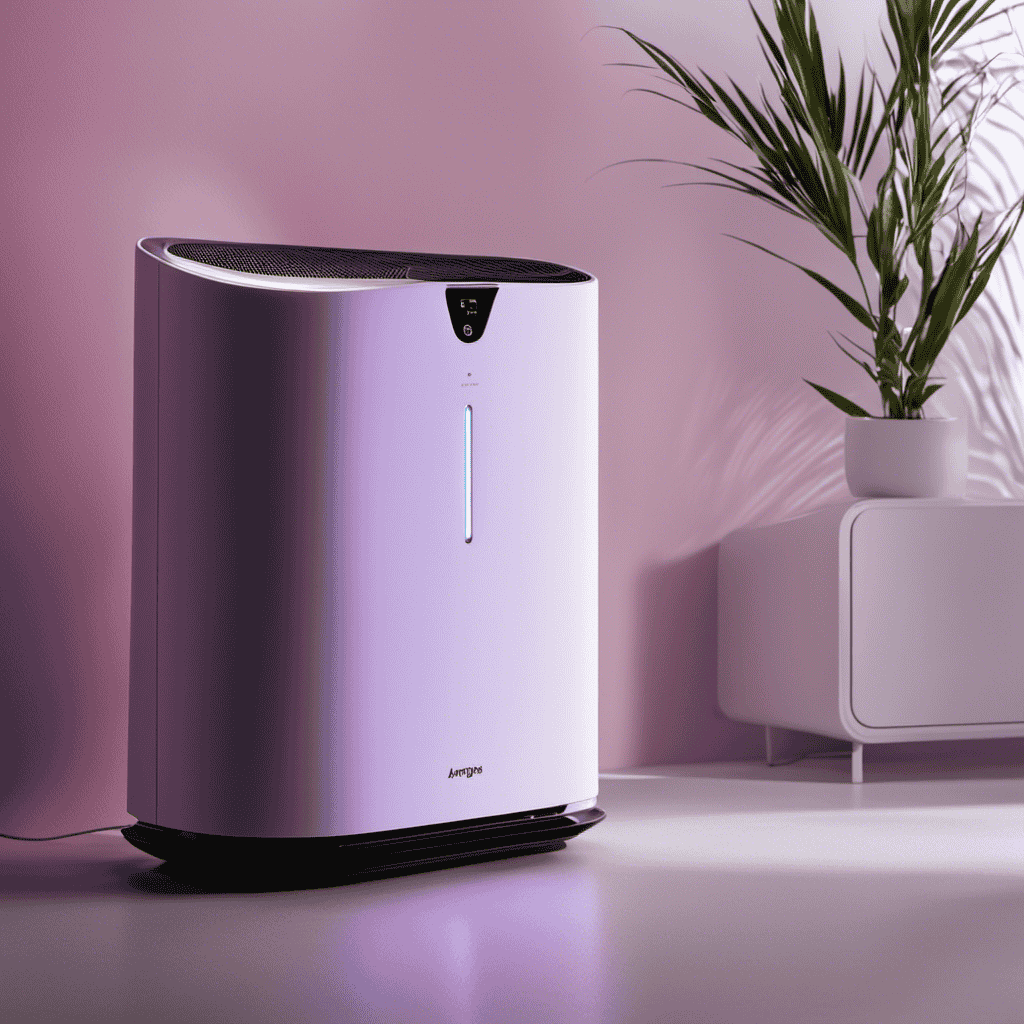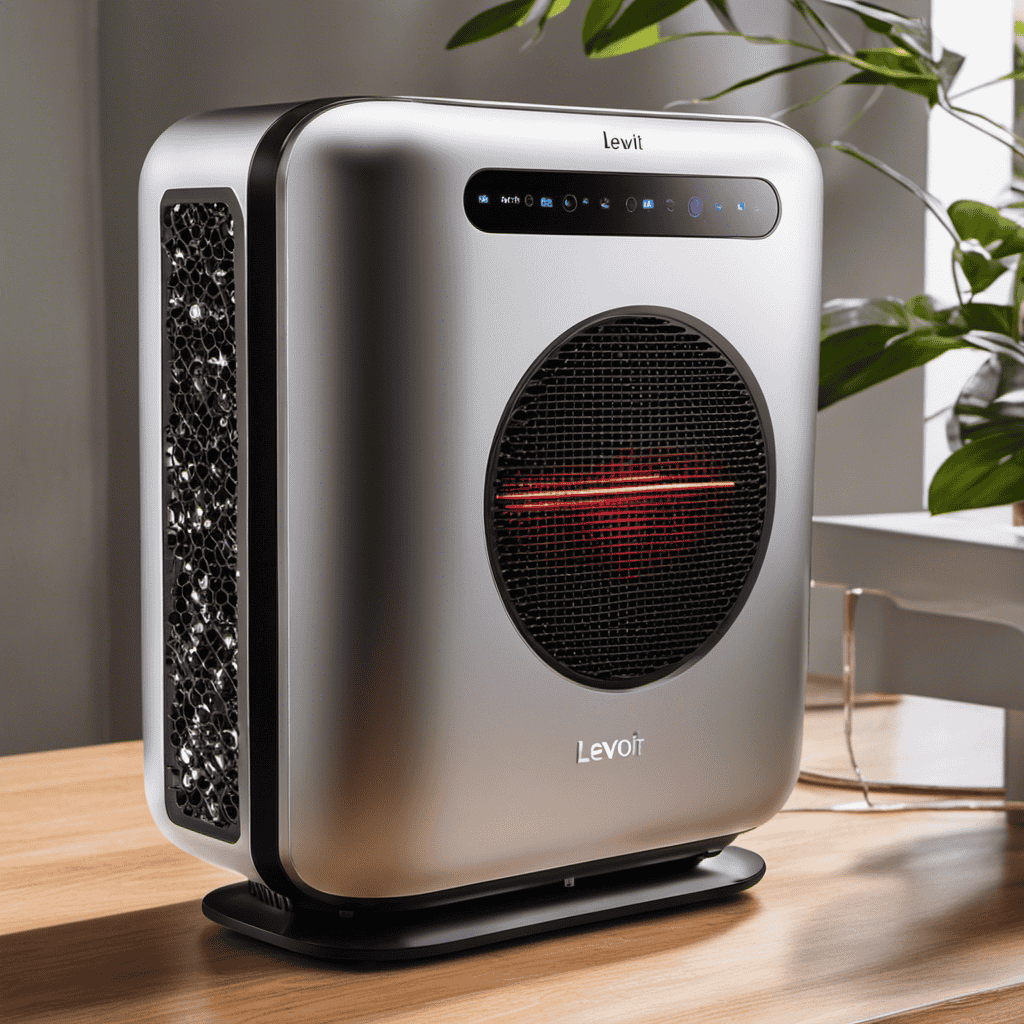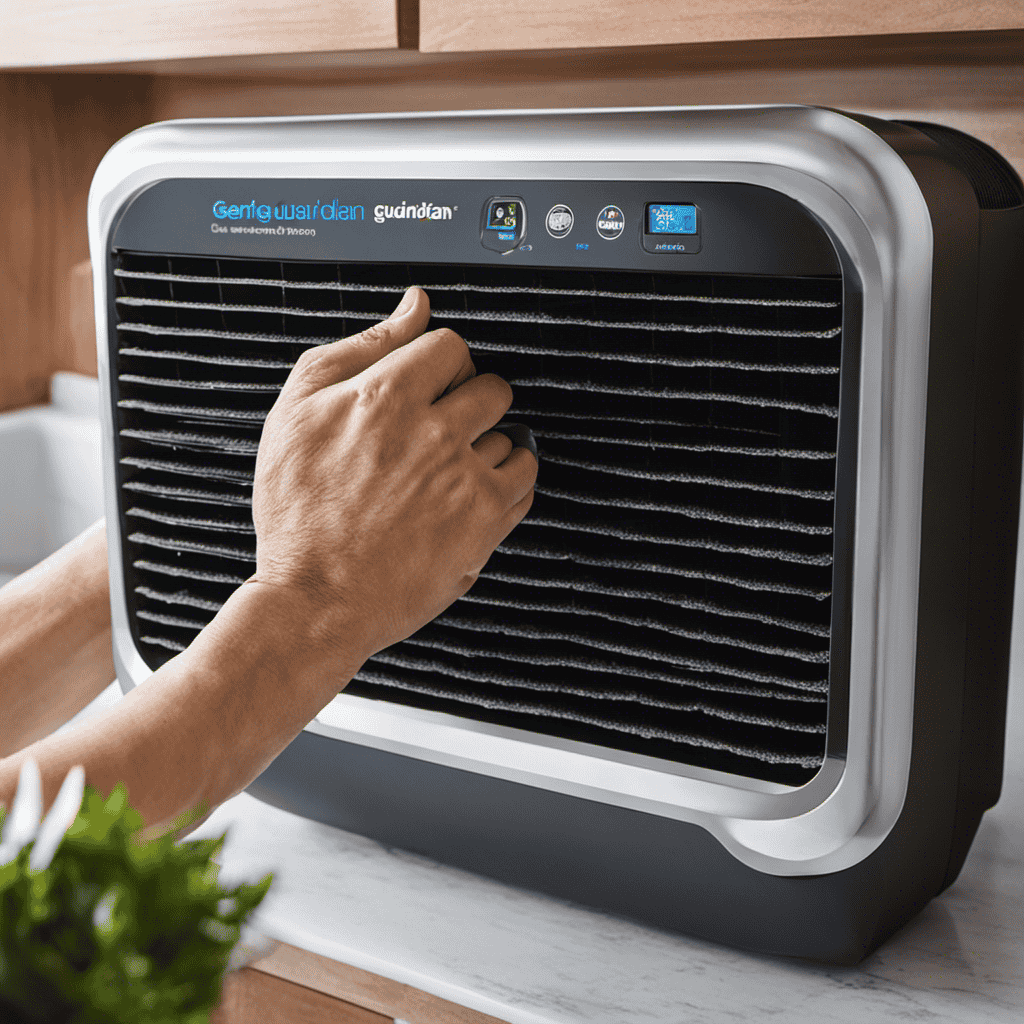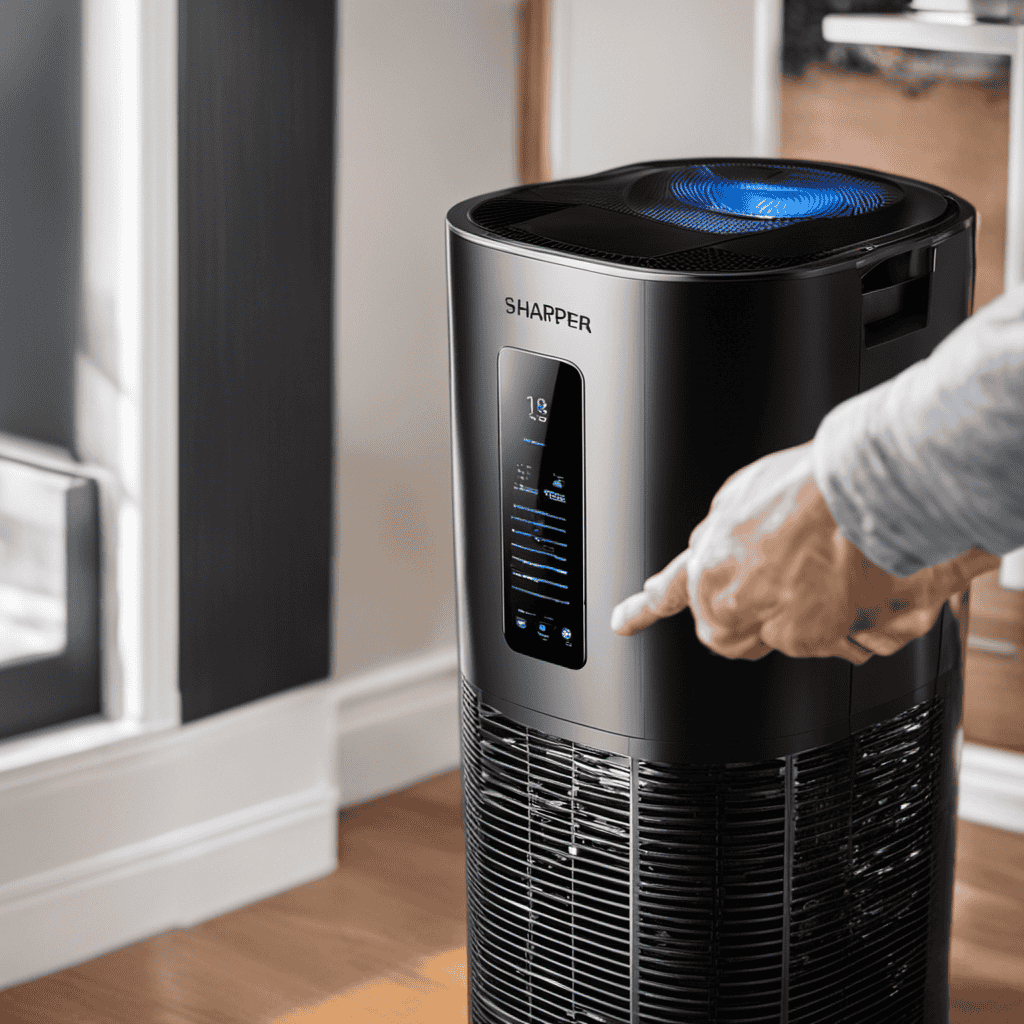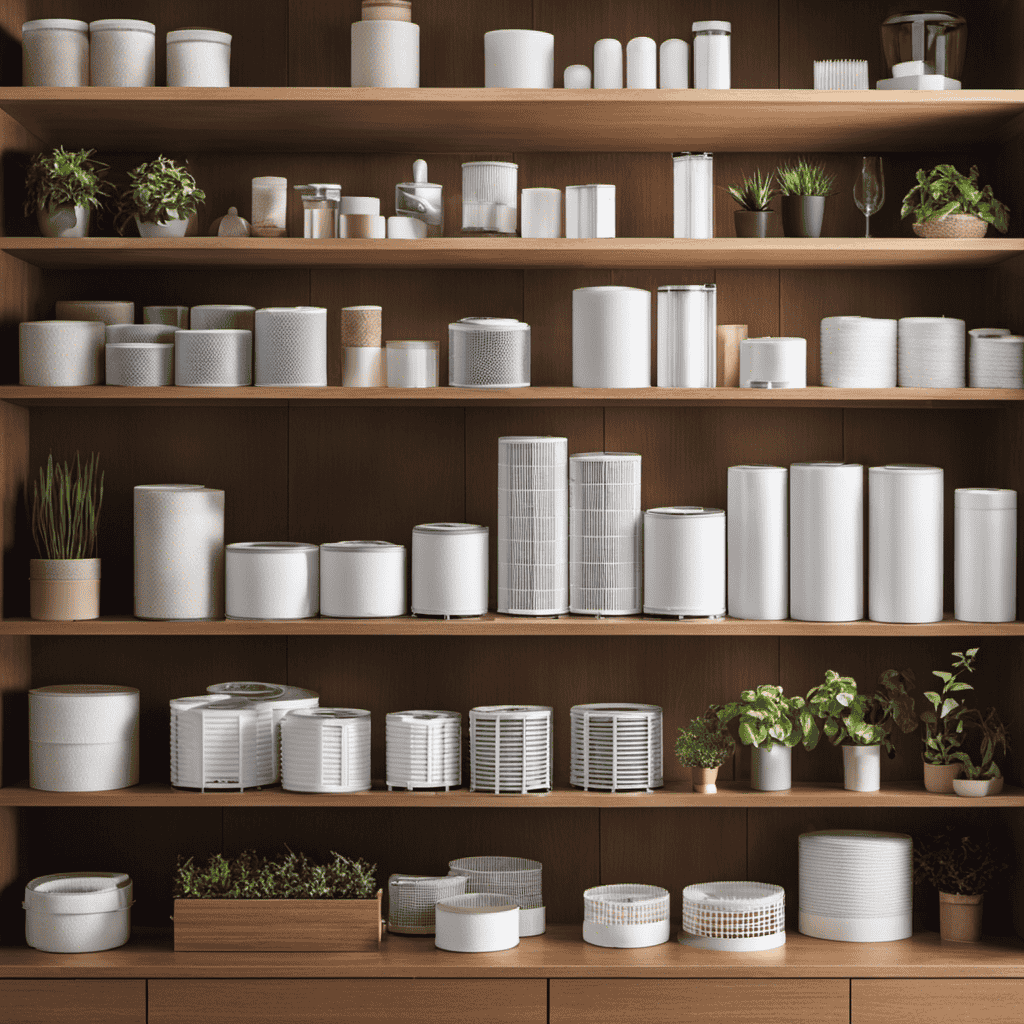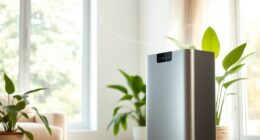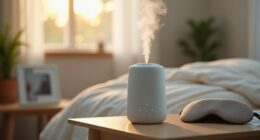Living with emphysema, I recognize how crucial it is to have clean air inside for controlling this disease. Selecting an appropriate air purifier can significantly enhance air quality and alleviate symptoms.
In this article, we will delve into the world of air purifiers specifically designed for emphysema patients. By exploring the types of air purifiers recommended, key features to look for, and effective usage tips, we aim to provide a comprehensive guide to help you make an informed decision and breathe easier.
Key Takeaways
- Emphysema patients should choose an air purifier with high filtration efficiency and low noise level.
- HEPA air purifiers are recommended for filtering out small particles that worsen respiratory symptoms.
- Activated carbon filters are effective in removing odors, gases, and chemicals from the air.
- Optimal placement of the air purifier in the room and regular maintenance are crucial for maximum efficiency.
Understanding Emphysema and Its Impact on Indoor Air Quality
If you have emphysema, it’s important to understand how it affects the quality of the air inside your home.
Emphysema is a chronic lung disease that causes damage to the air sacs in the lungs, making it difficult to breathe. The damaged air sacs are less efficient in exchanging oxygen and carbon dioxide, leading to a buildup of carbon dioxide in the body. This can result in respiratory symptoms such as shortness of breath, coughing, and wheezing.
Indoor air pollutants, such as dust, pet dander, pollen, and mold spores, can further worsen these symptoms and trigger respiratory flare-ups. Therefore, it is crucial to minimize exposure to these pollutants by using air purifiers that can effectively remove them from the air.
Now, let’s discuss key considerations for choosing an air purifier for emphysema.
Key Considerations for Choosing an Air Purifier for Emphysema
When choosing an air purifier for your condition, it’s important to consider factors such as filtration efficiency and noise level.
As someone with emphysema, managing indoor air quality is crucial to my overall health and well-being. Indoor pollutants can exacerbate my symptoms and make it harder for me to breathe. That’s why I rely on an air purifier to help remove harmful particles and improve the air I breathe.
Filtration efficiency is key because it determines how effectively the purifier can capture and remove pollutants from the air. Additionally, noise level is important as I need a purifier that operates quietly, allowing me to rest and sleep without disturbance.
Now, let’s explore the types of air purifiers recommended specifically for emphysema patients.
Types of Air Purifiers Recommended for Emphysema Patients
One option that is often recommended for individuals with emphysema is a HEPA air purifier, as it can effectively filter out small particles that can worsen respiratory symptoms. However, there are other types of air purifiers that can also be beneficial for emphysema patients. These include:
-
Activated Carbon Filters: These filters are effective in removing odors, gases, and chemicals from the air. They can help reduce exposure to irritants that can trigger symptoms in individuals with emphysema.
-
Ionizers: These purifiers release negative ions into the air, which attach to pollutants and make them heavy, causing them to fall to the ground. This method can help improve indoor air quality and reduce the risk of respiratory issues.
-
UV Germicidal Irradiation: This purification method uses ultraviolet light to kill bacteria, viruses, and mold spores in the air. By eliminating these harmful microorganisms, UV germicidal irradiation can help maintain a cleaner and healthier environment for individuals with emphysema.
When choosing an air purifier for emphysema, it is important to consider the specific purification methods and ensure that it meets the recommended air quality standards.
Features to Look for in an Air Purifier for Emphysema
A HEPA air purifier is effective in filtering out small particles that worsen respiratory symptoms in individuals with emphysema. When selecting an air purifier for emphysema, it is important to consider the optimal placement and noise levels.
Optimal placement of the air purifier is crucial to ensure maximum efficiency. It is recommended to place the purifier in the room where the person with emphysema spends the most time, such as the bedroom or living room. This will help to ensure that the air they breathe is clean and free from harmful particles.
Additionally, it is important to consider the noise levels of the air purifier. Some purifiers can be quite noisy, which may cause discomfort or disturb sleep. Therefore, it is advisable to choose a purifier with a noise level that is tolerable for the individual with emphysema.
In the next section, I will provide some tips for using an air purifier effectively with emphysema.
Tips for Using an Air Purifier Effectively With Emphysema
When it comes to using an air purifier effectively with emphysema, there are several key points to consider.
First, understanding the different filter types for emphysema is crucial in order to effectively remove pollutants from the air.
Second, finding the optimal purification settings is essential to ensure maximum air quality improvement.
Lastly, regular maintenance and cleaning of the air purifier is necessary to keep it functioning properly and effectively.
Filter Types for Emphysema
There are three main filter types commonly recommended for individuals with emphysema. These filters are designed to remove harmful particles from the air and improve indoor air quality. The three filter types are:
-
HEPA filters: Highly Efficient Particulate Air filters are known for their ability to capture small particles, including allergens, dust, and smoke. They can effectively filter out particles as small as 0.3 microns in diameter. HEPA filters are often recommended for individuals with emphysema due to their high filtration efficiency.
-
Activated carbon filters: These filters are effective in removing odors and chemical pollutants from the air. They work by absorbing gases and volatile organic compounds (VOCs). This can be beneficial for individuals with emphysema as it helps reduce exposure to irritants and pollutants in the air.
-
Electrostatic filters: These filters use an electrostatic charge to attract and capture particles. They are effective in trapping larger particles such as dust and pet dander. Electrostatic filters are often washable and reusable, making them a cost-effective option for individuals with emphysema.
Using an air purifier with these filter types can provide several benefits for individuals with emphysema. These include:
-
Improved indoor air quality: Air purifiers with HEPA, activated carbon, and electrostatic filters can effectively remove harmful particles and pollutants from the air, improving overall air quality.
-
Reduced exposure to irritants: By removing allergens, dust, smoke, and odors, air purifiers can help reduce exposure to irritants that can trigger symptoms in individuals with emphysema.
-
Enhanced respiratory health: Cleaner air can lead to improved respiratory function, reducing the risk of exacerbations and improving the overall well-being of individuals with emphysema.
Optimal Purification Settings
To optimize the purification settings, adjust the fan speed and timer according to your specific needs. Finding the optimal purification techniques for your air purifier is crucial to maximize its effectiveness in improving indoor air quality.
The fan speed determines how quickly the air is circulated and filtered, while the timer allows you to control the duration of operation. Higher fan speeds are recommended for larger rooms or areas with high levels of pollutants, while lower speeds are suitable for smaller spaces. Adjusting the timer ensures that the air purifier runs for the desired duration, whether it’s continuously or intermittently throughout the day.
By customizing these settings, you can create the ideal environment for cleaner, healthier air.
Now, let’s move on to maintenance and cleaning tips to ensure the longevity and efficiency of your air purifier.
Maintenance and Cleaning Tips
Regularly cleaning the air purifier’s filters and exterior will help maintain its efficiency and prolong its lifespan. Here are three maintenance tips and cleaning techniques to keep your air purifier in top shape:
-
Replace or clean the filters: Depending on the type of air purifier, the filters will need to be replaced or cleaned regularly. Follow the manufacturer’s instructions for the specific model you have.
-
Vacuum the exterior: Dust and debris can accumulate on the exterior of the air purifier, hindering its performance. Use a soft brush attachment on your vacuum cleaner to gently remove any buildup.
-
Wipe down the surfaces: Use a damp cloth to wipe down the surfaces of the air purifier, including the control panel, buttons, and casing. Avoid using harsh chemicals that may damage the unit.
Maintenance and Care for Air Purifiers Used in Emphysema Management
When it comes to maintaining and caring for air purifiers used in emphysema management, two key points to consider are filter replacement frequency and cleaning techniques for longevity.
The frequency at which filters need to be replaced will depend on factors such as the type of filter used, the level of pollutants in the environment, and the manufacturer’s recommendations.
Cleaning techniques, on the other hand, can help extend the lifespan of the air purifier and ensure its optimal performance.
Filter Replacement Frequency
The filter in an air purifier for emphysema typically needs replacing every 6-12 months. Maintaining a regular filter replacement schedule is crucial to ensure optimal air quality and effectiveness in managing the symptoms of emphysema.
Here are three important factors to consider when replacing filters for emphysema:
-
Filter Type: It is essential to choose the best filters for emphysema, such as HEPA (High-Efficiency Particulate Air) filters. These filters are capable of capturing small particles, including allergens, dust, and smoke, which can aggravate respiratory conditions like emphysema.
-
Filter Efficiency: Look for filters with high efficiency ratings, such as MERV (Minimum Efficiency Reporting Value) 13 or higher. These filters can effectively remove airborne pollutants and improve indoor air quality.
-
Regular Inspections: Regularly inspect the filter for signs of wear and tear. If you notice excessive dirt or debris accumulating on the surface, it might be time to replace the filter even if it hasn’t reached the recommended timeframe.
Cleaning Techniques for Longevity
To maximize the lifespan of your filters, it’s important to regularly clean them using gentle techniques. Proper filter maintenance is crucial for ensuring the effectiveness of your air purifier and maintaining clean indoor air quality.
The cleaning frequency of your filters will depend on various factors such as the type of air purifier you have, the level of pollutants in your environment, and the manufacturer’s recommendations. Generally, it is recommended to clean pre-filters every month and HEPA filters every three to six months. However, it is essential to refer to your specific air purifier’s manual for accurate cleaning instructions and frequency recommendations.
Cleaning techniques may involve gently vacuuming the filters or gently rinsing them with water. Always ensure that the filters are completely dry before reinserting them into the air purifier to prevent mold growth.
Regular filter maintenance will help prolong the lifespan of your filters and maintain optimal air purification performance.
Frequently Asked Questions
Are There Any Specific Air Purifiers That Can Remove Cigarette Smoke and Its Harmful Effects on Indoor Air Quality for Emphysema Patients?
Air purifier recommendations for emphysema patients include models with HEPA filters to remove cigarette smoke and improve indoor air quality. Using air purifiers can provide numerous benefits, such as reducing respiratory symptoms and enhancing overall well-being.
Can Using an Air Purifier Alone Improve the Symptoms of Emphysema, or Should It Be Used in Combination With Other Treatments?
Using an air purifier alone may not fully improve emphysema symptoms, but it can play a crucial role in reducing environmental triggers. Its effectiveness and limitations should be considered as part of a comprehensive treatment plan.
Is It Necessary to Have Multiple Air Purifiers in Different Rooms of the House for Effective Management of Emphysema Symptoms?
It is necessary to have multiple air purifiers in different rooms for effective management of emphysema symptoms. Using an air purifier alone may not be enough, as it should be used in combination with other treatments.
How Often Should the Filters in the Air Purifier Be Replaced to Ensure Optimal Performance for Emphysema Patients?
I replace the filters in my air purifier every 3-6 months for optimal performance. The best brands for emphysema patients are those with HEPA filters and activated carbon technology to remove allergens and pollutants.
Can Air Purifiers Completely Eliminate the Risk of Respiratory Infections or Exacerbations in Emphysema Patients, or Are There Other Preventive Measures That Should Also Be Taken?
Air purifiers can help reduce the risk of respiratory infections in emphysema patients, but they cannot completely eliminate it. Other preventive measures, such as regular handwashing, avoiding crowds, and getting vaccinated, also play a vital role in reducing the risk.
Conclusion
In conclusion, choosing the right air purifier for emphysema is crucial for maintaining indoor air quality and improving respiratory health. Considerations such as filtration technology, room size coverage, and noise levels are important when selecting an air purifier.
HEPA and activated carbon filters are highly recommended for effectively removing pollutants and allergens from the air. Regular maintenance and proper usage of the air purifier will ensure its optimal performance.
Just like a knight guarding a castle, an air purifier acts as a protective shield, keeping the air clean and free from harmful particles for individuals with emphysema.

